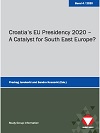Croatia’s EU Presidency 2020 - A Catalyst for South East Europe?
39th Workshop of the PfP Consortium Study Group Regional Stability in South East Europe
Dokumenttyp:
Study Group InformationErscheinungsdatum:
April 2020Herausgeber:
Dr. Predrag Jureković, Dr. Sandro KnezovićVerlag:
Study Group Information - Austrian National Defence Academy in co-operation with the PfP Consortium of Defense Academies and Security Studies InstitutesISBN:
978-3-903121-87-4Seiten:
107Autor(en):
Dr. Matteo Bonomi, Gordan Bosanac, Hrvoje Butkoviæ, Alba Cela, Emma Hakala, Dr. Predrag Jureković, Dr. Sandro Knezović, Sofia Maria Satanakis, Michael G. SchmunkBeiträge in dieser Publikation:
Vorwort
In the first half of 2020, the youngest EU member state, Croatia, holds ist first Presidency of the EU Council. This important political role means great responsibility for pushing EU’s priorities ahead but could be also a Chance to promote the interests of the Western Balkan candidate countries in the EU enlargement process. Both the intra-regional relations in the Western Balkans, but also the EU enlargement process as the main tool for supporting consolidation in this region, have passed through veritable crisis situations.
Against this background, the covered topics in this Study Group Information include the lessons that can be drawn from previous EU Presidencies, relevant developments inside the EU and their consequences for EU’s policies toward the Western Balkans, an analysis of the chances and obstacles for regional cooperation in the context of EU’s enlargement policies and reflections on democratization processes and intra-state reforms in the southeast European candidate and potential candidate countries.



